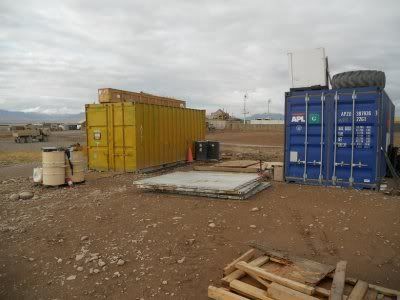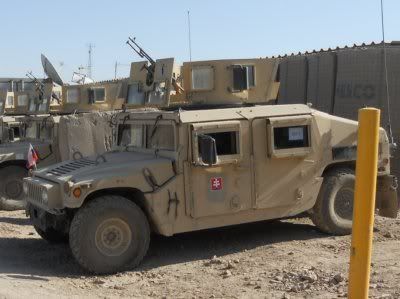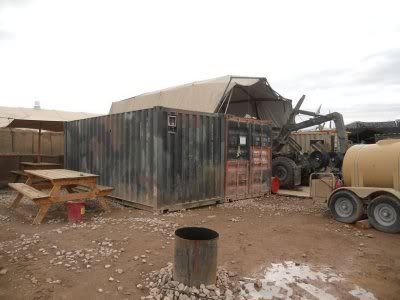
That's a bit what this draw down in Afghanistan is like. On a strategic level, it makes sense -- replace the logistics people with contractors since they don't go "outside the wire" anyway. That will reduce the total number of soldiers that need to be deployed while still maintaining our combat power.
At the operational level, though, it's a real mess, and I'm a direct beneficiary.
The Forward Logistics Element (FLE) that I'm in charge of has three missions: operating the ammunition supply point, handling flight line operations (loading and unloading aircraft, with some container movement), and supplying the outlying bases. To accomplish these missions, we used to have three sections from three different companies.
Then, the drawdown required the company of container handler- and forklift-drivers to curtail their deployment (despite my company having been in-country three months longer) and hand over the equipment to my company so we could hand it over to contractors after they left. (I could see the headache coming.)
There is just one problem: the stuff they used is in such bad shape that the contractors don't want it. In their opinion, the constant breakdowns would make it too costly to operate it.
It's a position that's hard to argue with -- we have no idea just how long the stuff has been without annual services. Our equipment is a bit like a used car with 150,000 miles on it that has never even gotten a 30,000 mile tune-up. It's all been ad hoc fixes.
Granted, the contractors have an understandable interest in *saying* the stuff is garbage -- they would prefer the government pay them to buy all new stuff so they can use that. But it seems a bit strange that the government would supply contractors with better equipment than they would provide their own Army.
Yesterday I was asked to look over the list of stuff the contractors are requesting so they can take over the forklift, etc. aspect of our job. A lot of it seemed reasonable -- office supplies, construction materials (so they can build their own office), and maintenance tents (the rainy season just started). We (the FLE) would provide the vehicles they would use.
They had asked for other, less reasonable stuff to be provided at government expense, but that had been denied -- and justifiably so.
Today, however, I got an email from someone in Kandahar asking why the contractors required so many "enablers." Since they were taking our job (or a portion thereof), why couldn't we hand over more of our stuff to them? Why are the contractors calling our facilities "substandard" and asking for new maintenance tents? And why can't they just take our office supplies, since (in his view) we won't need them after our mission is turned over.
They were sensible questions, but clearly the person asking them had no clue whatsoever what our situation is.
 First, all of our office space, furniture, and supplies are provided by the Australians. We use their A4 paper, their printer (for the shared classified line only -- we don't have a printer for unclassified stuff), and their copy machine. We drink their coffee and borrow their vehicles to pick up our repair parts. We used to have a Humvee, but we had to turn that in (I guess so the Slovakians could make better use of it).
First, all of our office space, furniture, and supplies are provided by the Australians. We use their A4 paper, their printer (for the shared classified line only -- we don't have a printer for unclassified stuff), and their copy machine. We drink their coffee and borrow their vehicles to pick up our repair parts. We used to have a Humvee, but we had to turn that in (I guess so the Slovakians could make better use of it).Second, whatever we do have is going to be needed by the rest of the FLE. Yes, the forklifts and container handler guys won't be needed, but there are still two other sections that will continue with required maintenance.
In short, apart from the equipment and some spare parts, we have *nothing* to give them. We in Transportation are used to getting the short end of the stick, but up here it seems we don't even get that. We're not even "bare bones" -- we're fossils that are missing a bunch of pieces.

So here's what I wrote in response:
Sir,--Then I said I'd be happy to go to the meeting and explain things, and blah blah blah, best regards, etc. Signed: me.
I attached a picture of our lower motor pool, where we keep and maintain our MHE [material handing equipment]. As you can see, we've got a pretty good setup. We've got some 463 pallets we lay down to keep from working in the dirt. When it's hot out we'll put camouflage netting over as a sun shade for our mechanics.
I'm not sure why contractors would feel this is substandard -- it's worked just fine for us for the past six months.
As far as tents, we have only one tent, and that's the one in the transportation section's maintenance area. This one is on our property book and will be transferred to the [next unit] when we (the transportation section) are replaced in a week or two. But, if you'd like, I can speak to the [new group's] commander about transferring that over. I should mention it would have to be set up on containers. I'm not sure if they have those available.
As for office supplies, we can give them what we've got. I looked through my desk and found some permanent markers that we can hand over so we can save the USG $50. And I can scrounge up some pencils and safety vests if need be.
Other things like office chairs have been provided by the Australians, so we can't really give them away, though we do have two extra chairs. I saw a printer on the list -- I'm sorry, but we don't even have one for ourselves. I wish we had one to give away.
That was fun.
In general, though, I struggle to calmly explain to people just how little we have to work with here. I'd like to think I've made a difference at least in that one respect over the past six months, but more often than not I'm disappointed.
Most irritatingly, this past week I ran into the battalion's public affairs officer -- the person to whom I've been submitting news articles and classified "storyboards" highlighting our accomplishments -- and her first question was, "So what do you do up here?" She didn't even realize until she saw me that I actually wasn't in Kandahar.
I can only shake my head and sigh.
*****
With all the new facilities, new equipment, and overpaid civilians this draw down is forcing us to pay for, I can't imagine how turning things over to contractors is going to help the U.S. government save any money. I just hope the reduced number of soldiers being overseas is worth it, because it's costing the U.S. a lot more to replace us logisticians than it would to keep us here.

No comments:
Post a Comment